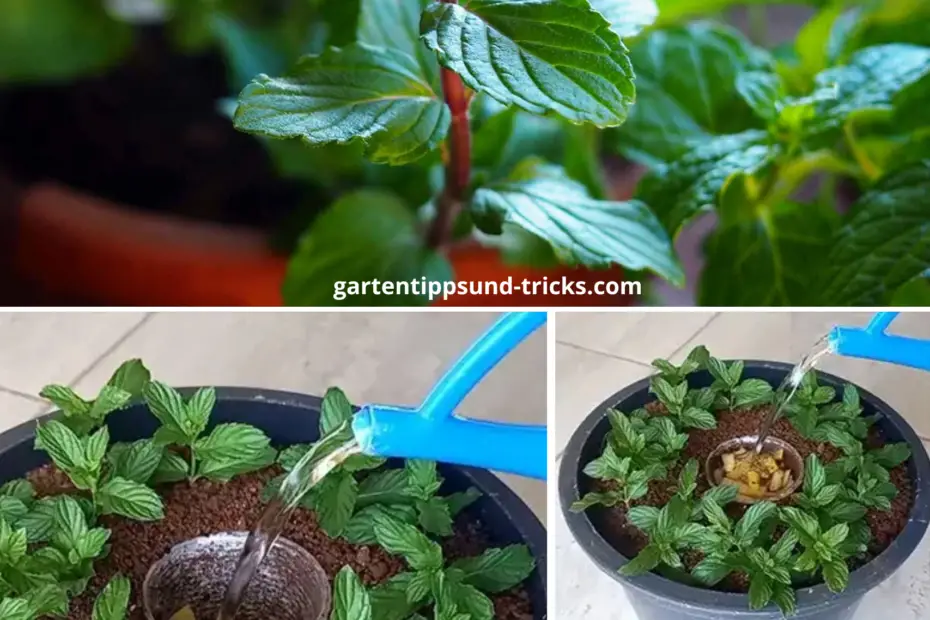
Introduction: Herb and garden lovers know that growing your own mint brings unparalleled joy. Mint is a versatile and aromatic herb and a beautiful addition to gardens and kitchens. However, to ensure a thriving mint garden, it is important to know the proper type of planting and care. In this article, we will introduce you to a unique and effective method of growing mint that simplifies the process and produces fantastic results. You’ll learn how to create a self-contained, fertilized reservoir that will provide your mint plants with the nutrients they need to thrive.
The Magic of Mint: Before we get into the planting technique, let’s quickly examine why mint is so popular among gardeners and chefs:
Versatility: Peppermint comes in different flavors, e.g. B. Peppermint, Spearmint and Chocolate Mint, each with its own unique taste and aroma. This versatility makes it an excellent addition to a variety of dishes, from salads and drinks to desserts.
Medicinal Properties: Peppermint is known for its medicinal properties such as aiding digestion, relieving headaches and reducing nausea. It also acts as a natural breath freshener.
Aesthetic appeal: Mint is visually appealing with its bright green leaves, making it ideal for ornamental gardens.
Planting Mint in a Unique Way: Growing mint using the “plastic cup method” is a smart and efficient way to ensure your mint plants receive consistent nutrition while minimizing the risk of overwatering. Here is a step-by-step guide:
Necessary materials:
- A pot or container of your choice.
- Potting soil or a garden soil mix.
- A plastic cup with holes.
- Mint cuttings or mint plants.
- Fertilizers such as garlic and banana peels.
- Water.
Step 1: Prepare the Pot: Choose a pot large enough for your mint plants. Mint can be invasive, so it is important to contain it. Fill the pot with potting soil or garden soil, leaving enough room for the plastic cup.
Step 2: Prepare the plastic cup: Take a plastic cup and make several small holes in the sides and bottom. These holes allow water and nutrients to slowly penetrate the soil, promoting even distribution of moisture and fertilizers.
Step 3: Place the Plastic Cup: Bury the plastic cup in the center of the pot. Place it so that the edge of the glass is level with the surface of the earth and looks like an “O” within an “O” from above. This makes it easier to add water and fertilizer.
Step 4: Add fertilizer: Add a mixture of crushed garlic and banana peels to the plastic cup. These natural fertilizers slowly release important nutrients into the soil, providing your mint plants with the nutrition they need.
Step 5: Plant the Mint: Plant your cuttings or mint plants around the plastic cup. Make sure they have enough room to grow but close enough to benefit from the nutrients in the jar.
Step 6: Watering: To water your mint, simply pour water directly into the plastic cup. The water seeps through the holes in the jar, carrying with it the nutrients from the garlic and banana peels, enriching the soil and nourishing the roots of your mint plants.
Step 7: Care: Mint is a relatively easy herb to care for, but it is important to keep an eye on it. Check the plastic cup regularly to make sure it contains enough water and fertilizer. Water the plants around the jar as needed to keep the soil evenly moist but not soggy.
The “plastic cup method” allows you to grow flowering mint plants with minimal effort. This innovative technique offers a simple but effective way to provide your mint with the nutrients it needs, avoiding overwatering. Mint’s aromatic and versatile leaves will enrich your culinary adventures and help your garden thrive. Try this method and enjoy the bountiful rewards of your mint garden! You like that? Share inspiration with your friends!
